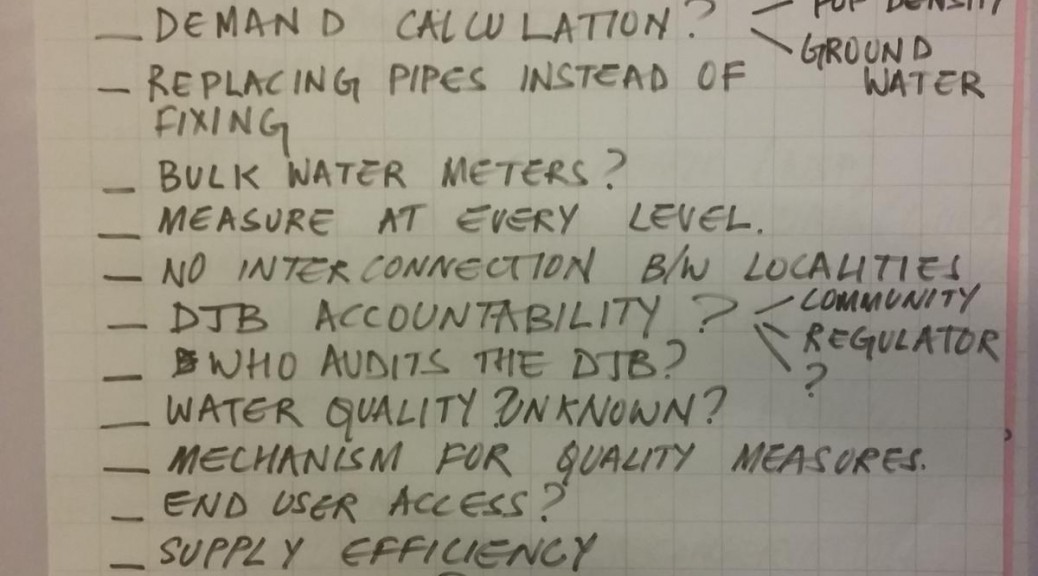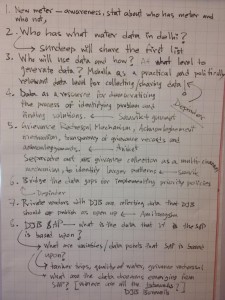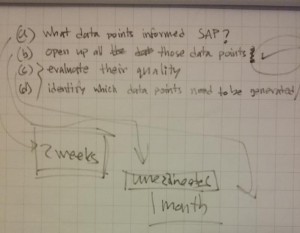A DataMeet-Up was held on Thursday, April 30, 2015, at the Akvo office to discuss the Summer Action Plan prepared by the Delhi Jal Board (DJB) and the data concerns thereof. Sundeep Narwani of Delhi Dialogue Commission presented the Action Plan. Kapil Mishra, MLA and Vice-Chairman of DJB, participated in the discussions and described the planned activities at DJB.
Here are the minutes of the meeting, prepared by Sandeep Mertia.
Sundeep Narwani, started with a presentation on Delhi Jal Board’s Summer Action Plan (SAP) 2015. Some important point from his presentation were:
- SAP is a short term measure for three months of summer
- Big problem: 40% of Delhi does not have enough piped water networks, and thus tanker services and unauthorised supply exist
- They have planned several measures for improving the systems of – tube wells, infrastructure (replacing old lines) and repairs, grievance redressal and sewage treatment.
The details are available in the Summer Action Plan document.
This was followed by a long discussion session on several issues and concerns – related to water problems in Delhi. Some of the important questions, comments and suggestions were:
- What is the authenticity of data which DJB has?
Answer: Doubtful. - What’s the organisational structure of DJB, and its relationship with the MCD?
Answer: DJB is a state body, independent from MCD - There is no data on bulk supply to colonies
- Very little end user data. Lack of meter reading and averaged bills are part of the reasons for this problem
- There is no way to interconnect supply between localities
- No data on quality of water
- Dr. Rajinder Kaur spoke about using existing spatial data maps of NCT/NCR, and the research conducted by the Indian Agricultural Research Institute on using spatial data for classifying ground water depth and quality
- Dr. Renu Khosla, from Centre for Urban and Regional Excellence spoke about using GIS data for slums
- Mr. Kapil Mishra, the Vice-Chairman of the DJB spoke at length about how they plan to transform the DJB. Also, he promised all data sharing from DJB’s side.
After a general discussion on various water related issues in Delhi, in the last segment we focused on framing the data problems associated with SAP 2015.
- Need to think about the water data which already exists.
- Sundeep will put up a list of people and organisations which have data on water in Delhi
- A suggestion was made to focus on Gram Sabha level data as well
- Need to prioritize the issue of water access to all, the missing data on ‘access’ related problems and appropriate mechanisms
- Some private bodies have been collecting data from GPRS meters, let’s try to open this data
- Need to map the borewells
- Need to interpret and understand the data which DJB requires.
To Do list
- We will list out all data sets that have informed the SAP document [Time: 2 weeks]
- Sundeep will share the data sets already available from DJB
- Once the list of data sets is prepared by us, it will be submitted to DJB via Sundeep and Kapil, who will then see if the mentioned data sets can be opened up. [Approximate time: 1 month]
- Once these data sets are available, we will evaluate the quality of these data sets
- Identify data sets that are missing and the ones that require a better collection process
Resources
We are using a Google spreadsheet to list out all data sets that informed the Summer Action Plan.
We are using HackPad to collect various resources.
Images of notes takes by Namrata Mehta and Sumandro Chattapadhyay at the meeting:





One thought on “Delhi Jal Board and Open Water Data: Report from DataMeet-Up”
Comments are closed.